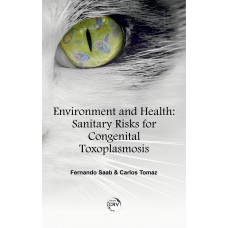Toxoplasmosis is an infection caused by the protozoan parasite Toxoplasma gondii, which can be transmitted to humans through ingestion of contaminated food, water, or soil, or through contact with infected animals. Congenital toxoplasmosis occurs when a pregnant woman becomes infected with T. gondii and passes the infection to her fetus. Congenital toxoplasmosis can lead to serious health problems for the fetus, including neurological and visual impairment, hearing loss, and developmental delays. One of the major environmental and health risks for congenital toxoplasmosis is exposure to contaminated soil or water. T. gondii is commonly found in the feces of infected cats and can contaminate soil and water through runoff or direct deposition. The book includes data from a study conducted in the Federal District of Brazil, which aimed to estimate the prevalence of seropositivity for toxoplasmosis among pregnant women. The study found that the prevalence of seropositivity for toxoplasmosis was highest among pregnant women living in areas with poor sanitation, such as those with inadequate water supply or sewage systems.
| Código: | L004-9786525145860 |
| Código de barras: | 9786525145860 |
| Peso (kg): | 0,392 |
| Altura (cm): | 21,00 |
| Largura (cm): | 14,00 |
| Espessura (cm): | 1,10 |
| Autor | Carlos Fernando; Tomaz Saab |
| Editora | CRV |
| Idioma | PORTUGUÊS |
| Encadernação | Brochura |
| Páginas | 196 |
| Ano de edição | 2023 |
| Número de edição | 1 |

